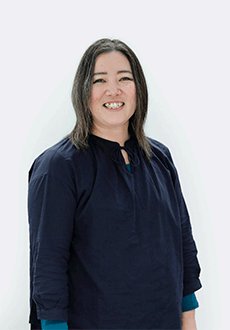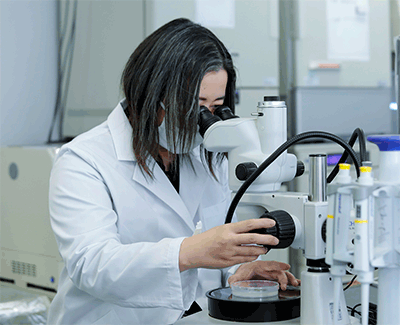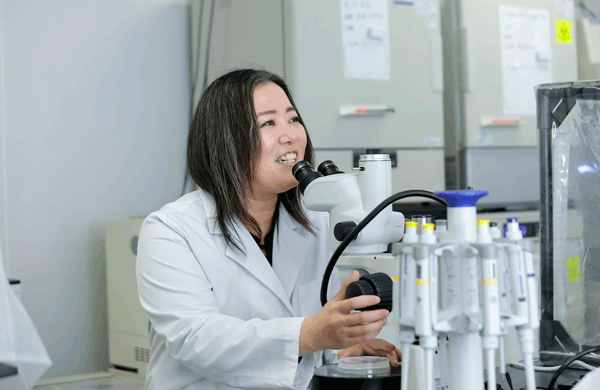Harnessing the power of invisible microorganisms for agriculture (Megumi Narukawa, Research & Development Scientist)

Many women active in a variety of fields work at RIKEN BRC. We interviewed 12 of these women for their insights on how they continue to flourish with work styles that fit their particular lifestyles.
In this interview, we spoke to Megumi Narukawa, a Research & Development Scientist on the Plant-Microbe Symbiosis Research and Development Team. Her love of plants inspired her to become a researcher.
Narukawa is also involved in research that benefits society, and spoke about how she feels a sense of accomplishment in her everyday life. She spoke to us about her thoughts on work, motivation, and hopes for the future, among other topics.
Profile
- Megumi Narukawa
- Research & Development Scientist, Plant-Microbe Symbiosis Research and Development Team
- Narukawa’s previous job was at Osaka University’s Research Institute for Microbial Diseases. In 2020, she joined RIKEN. She changed her research focus from intestinal bacteria to environmental microorganisms that live in plants and soil, and works on the cultivation of various microorganisms and research examining their reciprocal relationships.
I just went with the flow and found myself in the research profession.
I was a late bloomer—I wasn’t even aware of the research profession until I graduated from graduate school. At Tokyo University of Science, where I went, students start their graduation research in their fourth year of university. My research on lettuce was so interesting to me that I stayed overnight at university to conduct experiments, but at that time, I didn’t consider going into a doctoral program.
After I finished my master’s program, I wanted to do work involving research, so I joined the National Institute of Advanced Industrial Science and Technology (AIST) as a member of the technical staff. The work was fun, but I wanted to see where the research I had done in university could go, and also wanted to take the initiative on research as a research scientist, so I left AIST and went back to school to get my PhD.
After that, I experienced a wide range of fields, starting with the physiology of plants and moving on to pathogenicity research on phytopathogenic filamentous fungi and work on agriculture sites, as well as research into the intestinal bacteria of animals. My experiences were broad and shallow, but I felt like I was brave to take on so many different challenges, and I’m happy I was able to experience the way doors open when you challenge yourself.
Aiming to help society with research that actually helps people in their everyday lives.

Our laboratory also carries out joint research with companies, and we work on research that aims to find practical applications, such as the development of materials that help farms.
For example, we are currently working on research that looks for microorganisms that have the ability to suppress pathogens. One of the goals of our research is to find large amounts of such microorganisms and establish a way of using them so that we can reduce the use of the agricultural chemicals that we have relied on thus far to prevent diseases in plants. In this project, we use innovative methods and techniques to expand research on an unprecedented scale.
In farming at present, an agricultural revolution, based on SDGs, that limits the use of chemical fertilizers and chemical pesticides, which are harmful to the environment, is an urgent issue. I want to focus on this kind of research and make real contributions to agriculture and society.
I approach my research with the saying “persistence pays off” as my guide.
When I carry out an experiment, my heart really skips a beat when I get unexpected results. When I started my research, I was happy when the results were in line with my expectations, but I gradually began to find interest in phenomena that deviated from my own expectations. When the results do not match my expectations, this means that something new is concealed there, and I am motivated by the challenge of tracking down what that is.
I’ve also been particularly lucky, and have been blessed by the people around me. Until now, I was fueled by my own personal ambition to be the first to see things and sights that no one else had ever seen. I’ve been able to continue with this research work because of all the people who have supported me and my research and helped along the way.
I really like the phrase “persistence pays off.” There is so much that you will never find if you do not continue research, and giving up means that it’s at an end. There is still so much that I still want to do, and I want to get to the bottom of the phenomenon with this belief that persistence pays off.
